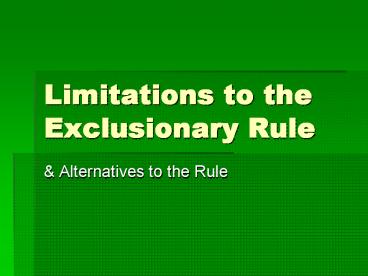Limitations to the Exclusionary Rule - PowerPoint PPT Presentation
1 / 25
Title:
Limitations to the Exclusionary Rule
Description:
Without E.R., 4th am -- 'a form of words,' valueless. An essential ... Structure of department effectively unaccountable Chief of Police. No independent reviews ... – PowerPoint PPT presentation
Number of Views:136
Avg rating:3.0/5.0
Title: Limitations to the Exclusionary Rule
1
Limitations to the Exclusionary Rule
- Alternatives to the Rule
2
Mapp
- Applies E.R. to st. courts applying 4th am
- other remedies worthless and futile
- Without E.R., 4th am -- a form of words,
valueless - An essential part of right to privacy
- imperative of judicial integrity
- Gives individual that which the Constitution
guarantees him - Otherwise encourage disobedience
3
Good faith exception
- Edmunds casefacts?
- 4th am violation?
- SCt decision in Leon?
- Reasoning in Leon?
- E.R. not a necessary corollary of 4th am
- Designed for its deterrent effect
- Not as a constitutional right of aggrieved
4
Good faith exception
- Where a police officer is acting in objective
good faith in executing a search warrant, 4th am.
does not require exclusion, even if probable
cause is lacking - Unless police officer acted knowingly or
recklessly in providing false information to
magistrate
5
Why does Penn. reject good faith exception?
- Penn. Constitution predates 4th am
- good faith is not relevant to right to be free
from searches not based on probable cause - Judicial integrity
- four corners requirement
- Policy matterpolice preferences?
- costs of exclusionary rule?
6
Prob. 6-1 Objective Good Faith
- Do facts in affidavit establish probable cause?
- Does warrant meet requirements of good faith
exception?
7
Prob. 6-2. Unwarranted Good Faith
- What outcome under Leon?
- What outcome under Texas rule?
8
Types of Hearings to which Exclusionary Rule
applies
- Applies
- Criminal trials Quasi-criminal proceedings
(forfeiture) - Does not apply
- Grand jury proceedings, administrative hearings
(immigration), parole hearings
9
At criminal trials
- If evidence excluded,
- Exclusion applies to governments case-in-chief
- Defendant can still open the door to suppressed
evidence by testifying inconsistently with
evidence. - Suppressed evidence admissible for impeachment
of defendant only
10
Inevitable Discovery Independent Source
- Nix v. Williamsfacts?
- Constitutional violation?
- What was the primary illegally obtained evidence?
- What was the fruit of the poisonous tree?
11
Inevitable Discovery Rule?
- If prosecution can establish by a preponderance
of the evidence that evidence inevitably wouldve
been discovered by lawful means, than evidence is
not excluded. - Puts prosecution in no better position than if no
police misconduct transpired
12
Evidence of inevitable discovery in this case?
- Was the place where girls body found within the
search area? - How soon did they estimate it wouldve taken to
find her?
13
Courts reasoning in not excluding the evidence?
- Exclusion serves only a deterrent purpose
- enormous social cost
- Not needed for deterrence purposes Significant
disincentivesincluding possibility of
departmental discipline and civil liability
14
Limits of this exception
- Is it necessary to show that a lawful
investigation was already underway? - Might police offer testimony of routine
investigative practices instead?
15
Inevitable Discovery Independent Source
- If police enter without a warrant, might they
argue that they couldve gotten warrant? - What if they dont seize evidence and get a
warrant based on previously known information
only?
16
Standing to Challenge Search
- St. v. WoodFacts?
- Constitutional violation?
- Does Wood have standing to challenge the
search? - If this were a federal case?
- In Vermont?
17
Rakas standing rule?
- A person must have a legitimate expectation of
privacy in the area searched to have standing. - How would a person prove a legitimate expectation
of privacy? - Did Wood have a legitimate expectation of privacy
in trailer curtilage?
18
Prob. 6-3. Place of Business
- Facts?
- Do Carter and Johns have standing to challenge
the search of apartment? - (Was it a search?)
- What if they had stayed overnight?
- What if they had stayed for dinner?
- If search of car illegal, who has standing? Only
the owner or the person using it
19
Alternative Remedies
- Need for adequate checks on police powers in
order to prevent widespread abuses as in
Rampart scandal in LA - Police supervision, hiring, training
- Disciplinary proceedings
- Civil tort remedies
- Criminal prosecution
20
Why did Rampart occur?
- culture of policing, emphasizing use of force
and code of silence - Hiring officers with violent backgrounds
- Structure of departmenteffectively unaccountable
Chief of Police - No independent reviews
- Unfair disciplinary proceedings
- Tainted use of force investigations
21
Some administrative remedies
- Civilian review boardsAre they independent of
police department? How much power do they have? - Internal Affairs Departments
- Early warning systems
22
Tort Actions
- Types of plaintiffs?
- Hurdles to plaintiffs?
- Qualified immunity if acted in good faith
- Do tort actions punish officers?
- If officers represented by state and indemnified
for damages? - Officers not routinely disciplined
23
Other hurdles
- Equitable relief in tort actions?
- Plaintiff wanted to court to bar use of chokehold
in cases not involving threat of injury. - Must show substantial likelihood that he would
be choked again. - Courts rarely impose injunctive relief
24
Suits by Dept. of Justice
- pattern or practice that violates
constitutional rights - Change in law allows federal government to bring
suits directly, rather than prosecuting
individuals criminally - Effective in obtaining consent decrees
25
Criminal prosecution for excessive force?
- LAPD involved in 571 shootings from 1977-87, many
involved unarmed civilians. - 1 officer indicted.
- Has any HPD officer ever been indicted for
killing or injurying in line of duty?































